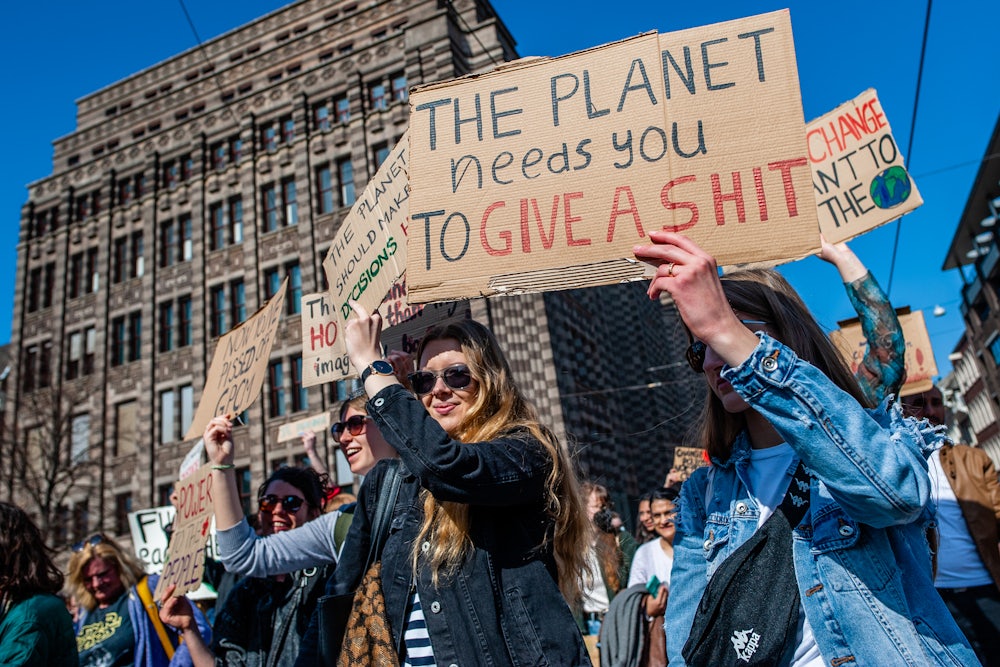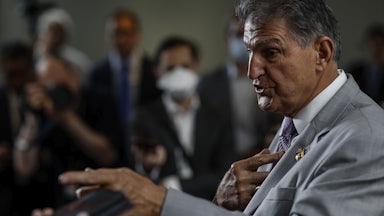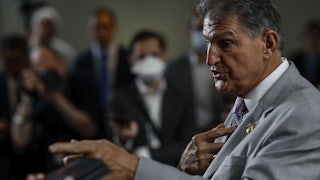There’s a rule in the climate movement about punching up. When we talk about the fossil fuel industry, it says, we should reserve our anger for the biggest players: the CEOs who lied about climate change for decades and the Wall Street tycoons who financed it all.
These top-tier climate arsonists deserve our condemnation a million times over. But does that really mean we should give everyone below the C-suite a free pass, when there are countless other professionals who have made careers out of sowing climate disinformation, blocking climate action, and generally doubling down on the fossil fuel industry’s catastrophic business model?
It’s true that blue-collar fossil fuel workers may have limited opportunities to choose how to support their families, and there’s no justification for criticizing someone for their line of work when they’re not in a position to change it. But that’s not the situation for a large portion of the industry’s enablers. Lawyers, engineers, scientists, P.R. consultants, asset managers, accountants, insurers, and the list goes on: There’s a vast array of professionals who have significant agency to choose where and how they earn a living yet continue to commit their time, energy, and talents to fossil fuel–related projects that threaten the future of our civilization.
These mid-level climate arsonists don’t currently pay much of a social price for this work. Maybe it’s time to change that.
The term “social license to operate” refers to widespread societal acceptance of certain business practices. Helping to destroy the world shouldn’t be socially licensed. If you have the training and flexibility to pursue gainful employment elsewhere, throwing your lot in with the corporations that are burning up our future is an unacceptable thing to do. And social pressure has always been one of our species’ strongest tools for reining in unacceptable behavior.
This is important in the context of fossil fuel professionals because abandoning the oil and gas industry (or sticking your neck out pushing for change from within) isn’t easy. Indeed, community stigma may be the only force that can provide the motivation necessary to take such a step.
In some professions, climate activists have already started to apply this pressure by launching campaigns to call out businesses that are contributing to planetary chaos. Law Students for Climate Accountability is working to exert pressure within the legal industry on firms that are facilitating climate breakdown, Clean Creatives has made a real mark on the P.R. industry by naming and shaming the agencies and creative professionals that produce fossil fuel propaganda, and the Fossil Free Research movement is taking this same approach to Big Oil’s influence in academic and research institutions.
But this kind of norm-shifting activity isn’t restricted to organized efforts within particular professions. Anyone who knows someone in their life who voluntarily contributes to the fossil fuel industry can take action to revoke the death machine’s social license.
These conversations can be scary. In my experience, it’s a lot harder to ask someone I personally know to confront their role in the climate crisis than it is to attend a protest in relative anonymity. But people in our lives deserve to be treated as moral agents. They deserve to be encouraged to reject complicity. And if they refuse to stop helping to destroy the world, well, they deserve to pay a social price for that—maybe they shouldn’t be welcomed at the neighborhood BBQ, or allowed to coach Little League, if they’re helping to wreck those kiddos’ future or poison the neighborhood.
Of course, one could argue that this approach is more likely to spark defensiveness. Certainly, some people respond to criticism by doubling down. But there’s a great deal of research showing that peer pressure can have a major impact on our political behavior. And we can already see signs that social pressure related to climate change is affecting the employees of fossil fuel majors. A recent survey of 10,000 energy professionals found that more than half of oil and gas workers are considering moving to the renewables sector, citing climate change as their main consideration. Last year more than 1,100 McKinsey employees called for their company to rethink its work for fossil fuel companies, writing, “Our positive impact in other realms will mean nothing if we do not act as our clients alter the earth irrevocably.” And this May, a safety consultant at Shell, Caroline Dennett, publicly severed ties with the company, sharing a resignation letter with 1,400 employees that blasted Shell’s deceptive double-talk on climate. What’s more, Dennett claims that staff retention is already a big problem for the fossil fuel industry and that people are leaving because “they fear reputational damage or can’t square the work with their values.”
Hammering fossil fuel executives for their greed, corruption, and duplicity is important; I’ve argued we need to be doing a lot more of it. But at this late stage, we don’t have the luxury of ignoring the culpability of other professionals whose work helps enable climate breakdown—particularly since, as compared to CEOs and billionaires, a larger number of climate-concerned individuals can actually engage with these people on a day-to-day basis. If we’re going to win this fight, climate warriors need to be climate warriors in every arena of our lives. Yes, it may feel uncomfortable to bring our climate advocacy into our social relationships. But a livable future is worth a little bit of awkwardness, right?










